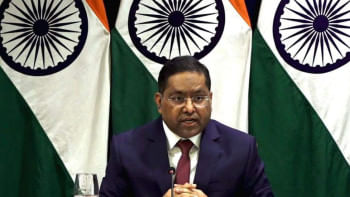The Spirit of the International Mother Language Day

Sometimes I wonder what life would be like if I were to subscribe to one particular language that didn't have any link with my roots. One particular language, which I didn't know like the back of my hand.
The blood shed by the martyrs and protestors on 21st February, 1952 paved the way for the modern Bangladeshis resisting tyranny throughout histories after histories. The act of valor made us emerge triumphant nurturing the sentiments that taught us to resist and to defy tyranny.
It is for the resistive sentiments which have trickled down from '52 in the psyche of the civilians that this country has witnessed movements, stirring waves over the post independence years.
The 1990 Mass Uprising
In The Good Muslim, Tahmima Anam calls him The Dictator. He had garnered hatred for all the right reasons. He was infamous for validating the already validated leniency when it came to war collaborators. Collaborators were often appointed as ministers under his regime. His leniency was a major blow to the foundation of Bangladesh's liberation as it allowed the criminals to roam free. Moreover, he attempted to make Arabic a fundamental language. It was as though he had been the reincarnation of Mohammad Ali Jinnah, whose words had sparked the Language Movement of '52. The sentiments of '52 worked their charms and the dictator backed off at the cost of many sufferings. In the battles that had ensued in the campus of Dhaka University for two days to overthrow the regime, Dipali Saha, Kanchan, Joynal, Mozammel and Zafar died. Streams of protests ran throughout the end of the year. Students led a significant portion of them. The whole country had risen up to denounce the Dictator and succeeded, preserving the nationalism. The protests saw the Police versus stick wielding students and civilians. The dissidents versus the silencers. The loud ones versus the unheard. The Patriots versus the Traitors.
The aftermath born out of the circumstances is a testament to the fact that the sentiments were invincible and still alive. Clearly, the hands of a resilient nation weren't meant to be tied.
2013 Shahbag Protests
The memories are still fresh. My neighborhood lit up with candle holding inhabitants as they chanted slogans in solidarity with the protestors in Shahbag. The news channels regularly covered the events, interviewing the activists. The social media people ceremoniously expressed their opinions and shared images of the protests. I remember being stuck in traffic for a long time, for a cause. I remember my friends say how the mobs were so jubilant and many people extended their support for the protestors by offering them food and other necessities, and motivating them to go on.
Many civilians took to the streets demanding death penalty for the razakaars infamous for their war crimes. It was a turning point in the history of our country as it conveyed the message loud that those who had active participation against our liberation didn't deserve to breathe without death penalties. The voices of the protestors made sure that the razakaars had no place in the country.
The protestors' lungs became one, their voices one, and Shahbag more alive than ever.
Songs were sung in unison—a sea of singers driven by patriotism, speeches were given by commoners, activists, prominent writers, flags were waved and worn, candles were held, plays were staged, celebrations were in co-existence with protests, and both Qader Mollah and Sayeedi were given death penalties.
The souls of those who had died at the hands of the traitors shed tears of happiness. The memories of the11-year old girl who had been raped, the 344 people who had been killed in Alubdi village, Hazrat Ali, the poet Meherun Nesa—were revived.
2018 Road-Safety Protests
After the tragic deaths of two students a series of protests broke out demanding justice, soon after the quota reformation movement.
Students boycotted their classes and came out in the streets protesting peacefully. The protests took a violent turn when the police and other groups tried to dismiss the unarmed protestors. It was at the backdrop of the protests when Shahidul Alam had been detained, which caused outrage within an outrage.
I remember how the circumstances were back then. At times, they were tension filled. At times, ceremonious. Alongside students, teachers and guardians hit the roads too, extending their support, standing in solidarity with them. The protestors controlled the streets dethroning the original controllers; our so called traffic police. They made lines so that vehicles as per their categories maintained their lines, not busying the streets. Ambulances and emergency vehicles were given priority. The faces of kindness and warmth floated up and down the newsfeed as did the faces of horror and injustice.
The protests caught the attention of the international media like every other protest staged by the mass and made our eyes open to the fact that the inhumane conditions of our roads need to change. After all, the lives of those who were meant to be the future of the country were at stake.
We have lived through the movements. We have spoken the language of defiance. We have seen what solidarity looks like. We have seen how powerful resistance can be. Even though it didn't bring the desired results in some cases, it did shape our country's history. Our RMG workers are constantly asking for pay raise as they aren't paid well despite being vital economic contributors. They have taken to the streets too. What binds all the protests and movements despite being different from one another are the resistive sentiments of '52.
I see the spirit of '52 manifesting itself in different protests and movements that our youths participate in. And I hope that they never yield.
Shah Tazrian Ashrafi is an occasional contributor to The Daily Star Literature Page.


 For all latest news, follow The Daily Star's Google News channel.
For all latest news, follow The Daily Star's Google News channel. 



Comments